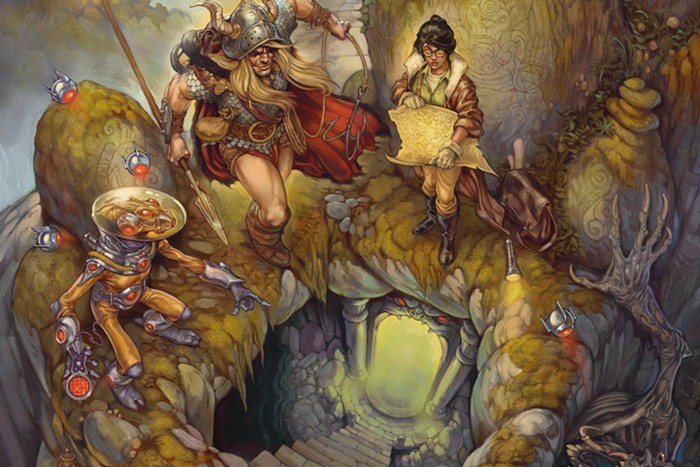by Peter Carey
(Knopf) $24
If you ask me, there is not nearly enough of the spirit of the hoax left in the literary world. It is an instinct that vanished, I suppose, when the impulse to write memoirs took over, so that even novels became lightly imagined wrappers for the various shapes of truths--our own, our families', the world's. Some of us have had quite enough of reading someone's childhood worked out through dully lyrical prose, with all the requisite cruelty and ambivalent epiphany. What I mean is that we are far too invested in the truth, and too little interested in acts of imagination.
As an antidote to this tendency, there is Peter Carey's recent My Life as a Fake, the marvelously invented story of a literary hoax gone terribly wrong, or perhaps terribly right, depending on how you care to look at it. In post-World War II Australia, the cranky poet Christopher Chubb invents a dead working-class poet, whom he calls Bob McCorkle, as a kind of Modernist revenge against his schoolmate David Weiss, the successful and charming editor of a literary magazine. (Chubb is a mediocre, conservative poet devoted to the ridiculously difficult form of the double sestina.) Weiss declares McCorkle a genius and publishes his poems, which occasions an obscenity trial, a good deal of public embarrassment, and Weiss' suicide. This alone would be hard enough for Chubb to bear, except that toward the end of the trial, a giant madman--"the damaged beast of the Antipodes"--materializes in the courtroom, claiming to be McCorkle. Here is the specter that will dog Chubb until his death, a monster of his own creation, a living cautionary tale--straight out of Greek mythology, out of Victorian ghost stories--about conjuring exactly the monster we both desire and dread.
McCorkle kidnaps Chubb's adopted daughter, drags him through the jungles of Malaysia, and torments him in the way only a nightmare of our own making can. But that's not the only story in My Life as a Fake. Chubb's version of things is told inside a series of elegant frames, each frame with its own history, so that the book unfolds unexpectedly, angularly, like a very tall man getting up from a low-slung chair. The novel's voice, which contains a small chorus of other voices, is that of Sarah Wode-Douglass, a prim literary editor who, after the fact, tells Chubb's tale and all the other tales embedded in it. Sarah has been lured to Kuala Lumpur by John Slater, a poet she blames for her parents' breakup and her mother's suicide many years before. (She somehow thinks that a trip with Slater will bring her peace and closure, and this is the whole mechanism that sets the plot in motion: a rather stuttering gambit and, for a meticulous writer like Carey, one introduced rather too swiftly and incompletely. On the one hand it's the book's only disappointment--one suspects he could have written another whole novel on it; on the other hand, thank goodness we are not treated to another litany of childhood wounds in search of healing information. Perhaps the whole thing is a bit of mean parody on the current rage for long emotional journeys to settle old childhood scores.)
It's in Kuala Lumpur that Sarah meets Chubb, laboring as a bicycle mechanic in a squalid shop; he offers her a poem written by McCorkle, although whether Chubb-as-McCorkle wrote it or McCorkle-the-monster wrote it is, and more or less remains, unclear. Needless to say, the poem is genius, the real kind, the kind of manna that rarely falls to an editor, and in order to acquire it for her magazine, Sarah sits with Chubb as he slowly, rather sadistically, unfurls his story (beginning, "I loathe dishonesty"), and she, like the victim of the Ancient Mariner, "cannot chuse but hear."
My Life as a Fake is both devotional and cautionary with respect to art--as it should be with such a complex issue in its crosshairs. In this imagined world, the pursuit of art eventually leads to terrible things--nervous breakdowns, death, the admission that a life has been led in constant twilight mediocrity. Carey is gentle but remorseless about the greed of the editor for real genius, after a lifetime of publishing "adequately talented" poets; Chubb's English also can be seen as a kind of literary revenge--after many penitential years in Kuala Lumpur, it's invaded by Malaysian inflections. And your allegiance, as a reader, is subject to shifts that would suggest that life cannibalizes, rather than being enriched by, art: You start by feeling bad for the creator, for the hoax perpetrator whom no one will believe is the author of some very good poetry. In the end you feel bad for his creation--born of cynicism and competitiveness, and killed ironically (Chubb tries to save McCorkle from the more punning Graves' disease, but as it turns out he has leukemia). In art, you think, might begin our responsibilities.
On the other hand, you are delivered this information via a work of art, a book full of fakery and dishonesty and scheming and language barriers. But My Life as a Fake doesn't bludgeon you, as some of those irritatingly lyrical books do, with the fact of its art. You simply fall under its sway.
In the book's afterword you learn that Carey's plot is not entirely invented, but is loosely based on a similar literary prank that happened in Australia in the 1940s. It seems a sort of double-game, doesn't it? The novelization of a real fraud? The only fitting end for for Chubb and for Carey is that their inventions eventually become (or always were) the truth.
Peter Carey reads at Elliott Bay Book Company (101 S Main St, 624-6600) on Wed Nov 19 at 8 pm.


















